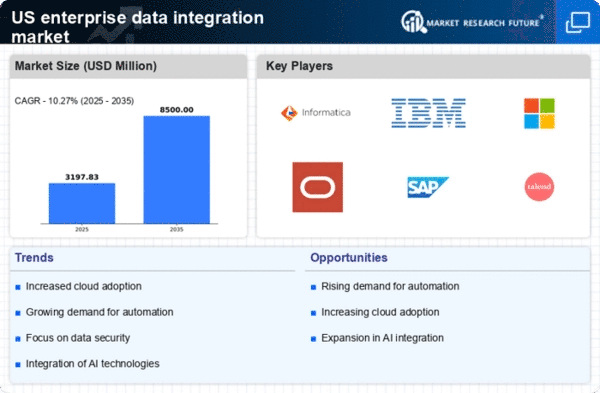Rise of Hybrid IT Environments
The shift towards hybrid IT environments is reshaping the enterprise data-integration market. Organizations are increasingly adopting a mix of on-premises and cloud solutions to optimize their IT infrastructure. This hybrid approach necessitates advanced data integration tools that can seamlessly connect disparate systems. As of November 2025, it is estimated that over 60% of enterprises operate in hybrid environments, creating a substantial demand for integration solutions. This trend not only enhances flexibility and scalability but also drives innovation in the enterprise data-integration market, as businesses seek to leverage the best of both worlds.
Increased Focus on Customer Experience
Enhancing customer experience is a primary objective for many organizations, significantly impacting the enterprise data-integration market. Companies are increasingly integrating customer data from various touchpoints to create a unified view, enabling personalized interactions. Research indicates that businesses that prioritize data integration for customer insights can achieve up to a 20% increase in customer satisfaction. This focus on customer-centric strategies is driving investments in data integration technologies, as organizations aim to leverage insights for improved service delivery and engagement, thereby fueling growth in the enterprise data-integration market.
Regulatory Compliance and Data Governance
In the enterprise data-integration market, regulatory compliance is a significant driver, as organizations face mounting pressure to adhere to data protection laws such as GDPR and CCPA. These regulations necessitate robust data governance frameworks, compelling businesses to invest in data integration solutions that ensure compliance. The market is projected to grow by 15% annually as companies seek to mitigate risks associated with data breaches and non-compliance penalties. Furthermore, effective data governance enhances data quality and accessibility, which are essential for informed decision-making, thereby further propelling the enterprise data-integration market.
Advancements in Data Analytics Technologies
The rapid advancements in data analytics technologies are propelling the enterprise data-integration market forward. As organizations seek to harness the power of big data, the need for effective integration solutions becomes critical. Enhanced analytics capabilities allow businesses to derive actionable insights from integrated data sources, leading to improved operational performance. The market is expected to grow by 18% over the next five years, driven by the increasing adoption of advanced analytics tools. This trend underscores the importance of data integration in enabling organizations to leverage analytics for strategic advantage, thereby reinforcing the enterprise data-integration market.
Growing Need for Data-Driven Decision Making
The enterprise data-integration market is experiencing a surge in demand as organizations increasingly recognize the importance of data-driven decision making. Companies are leveraging integrated data systems to enhance operational efficiency and improve strategic planning. According to recent studies, organizations that utilize integrated data solutions report a 30% increase in decision-making speed. This trend is particularly pronounced in sectors such as finance and healthcare, where timely data access is critical. As businesses strive to remain competitive, the need for seamless data integration solutions becomes paramount, driving growth in the enterprise data-integration market.

















